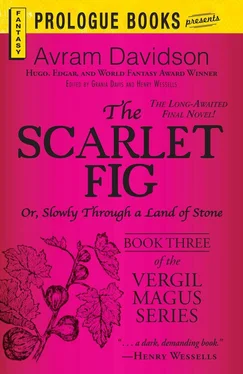
Somehow he knew the old one’s name was Teter, and that in him there was no harm. And somehow he knew that the large one’s name was Alcinoüs. Somehow he knew that these were no names ever they gave themselves.
And somehow he knew that Alcinoüs meant to kill him. Although, somehow, he knew not why. There were many things he knew not now, and sometimes his mind seemed clear and sometimes it did not. Sometimes he thought, Now the Black Dream again again . And sometimes he did not.
Despite the taken-for-granted teaches of the organized and historical religion, the goat-footed nymphs were nought but the she-forms of the goat-footed satyrs. Another article of faith a-shattered … not through the scornful preaching of some peripatetic philosopher or from any word of home-grown cynic; but from the simple sight. His sight was clearer now. Often. “Numph,” said the old one, jerking his lugs (“ears” they could scarce be called) to the scarp of rock and shale and scree, through which over and down floated a whisp, a fraction, a ghost of a breeze: “Numph” — and hardly had his nares recognized a slight new scent, scarcely had he time more than to reflect on that well-known vowel-shift: hybris to hubris, Ludda to Lydda, Cumae to Kyme, Tur to Tyre, than she appeared, far less dainty than dumpty, thumping rather than tripping, tween tree and tree; in her hair flowers … or … anyway what looked like parsnip greens; the nymph was scarcely of the sort seen on krater or in illumed pages of parchment. The nymph of that island, someone had writted, smites the hearts of men as twere the face and form of Elen of Troy . Vergil swiftly thought on all this with a sinking of the spirit (his spirit must have risen if it could sink at all now) at the sight of this figure, this native of the rocks: low-hipped of body, long of head, heavy and almost horse-like yellow teeth broken here and there, huge nose, huge chin: could only allow himself, astonnied, to listen to the vatic voice (who knew if Troy had yet burned in war or if Troy and war and burning were yet to come?) “Was this the face that launched the thousand ships, and burned the topless towers of Ilium?” — “Numph,” emphasized old Teter. “ Numph. ”
Vergil felt rather somewhat the same surprise as once, when so very young a man as scarcely to be called a man at all, after even so some long time (to him, then, some long time) of not having seen a certain sight, a certain she had bared her breast to him: a gesture in the great game between the sexes (“The silly game,” who had said that? certain it was not that certain she, he’d instantly bethought him), but where he’d thought to have seen something like the size and shape and color of one-half the small fruit of the rose-mulberry, he saw instead something like an omelette made from the egg of a damned odd bird. And the voice of Emmalina murmured at his ear-well, “Now you know what a woman’s nipple looks like.” And what am I supposed to do about it? was his thought. Emmalina solved the mystery, said to the servant, unseen by him till then, “Give me the child.”

The satyrs had sometimes been beset by children of men (though certainly and surely not by any children of the Lotophages, and indeed they left the one the other entirely alone: why did the satyrs never drink of the liquid of the Scarlet Fig nor eat of its fruit? because it reminded them of honey they conceited it was of honey-taste, a laithly taste to them. The satyrs were always enemy to the bee.) … beset by children of men, who hooted and cast stones. In saying, “children of men,” this is metaphor as used by the ever-licensed poet; one does not mean boys and girls. The crew of foreign ships is meant, or some of the crew; crews very seldom being recruited from aristocrates or philosophes. Nor would one suppose them to be the crews of ships of Tartis: the Tartis-system, though in decay, would from ancient usage and experience well know better than to antagonize any on any shore or coast. Men off casually-come-thither ships of the less dulcet ports of empery had sometimes hooted and cast stones. Did thee and me ask them why , the whores’ gets, they would stone thee and me. The satyrs were perhaps not very deep of apprehension, yet perhaps they were … Beset, they fled to their homes in the rocks, to eat of their harsh, dull diet: the prickly eringion, for example, which grows only on salt sea-sand or on rugged, stoney waste and is by mankind used only as antidote for deadly nightshade; such things as those they ate.
But of the soothing Scarlet Fig, ate they never, not.

Folk thought that satyrs were funny. It was common and frequent at festivals for some to be got up as satyrs — the horns all wrong and the ears all wrong — mincing along or conveyed along in wagon, wearing protrusive artifacts fashioned of wood and leather; and folk would laugh, for folk thought that satyrs were funny. But they were not funny. Word could not convey their sometime brutal malignity.
There were no happy satyrs.
Often he had seen them eating samphire, raw, on crag-faces where, he might have, moments earlier, have made his oath, even the chamois and the rock-tibbu dared not adventure; once, in such a place, just, he had seen them copulating, fast and bloody and fierce. Twice he had encountered a set of them mumbling off the splintered ground handfulls of windfalls of some small stone-fruit which lay in ragged heaps smelling as sour as an unwashed rustic wine-press; two simply moved away as even sheep would move away; old Teter remained squatting and munching; and one had stamped off, making that noise deep in his chest; and one, before leaving, had looked at him — for a swift flash of time like a glint off a shard of glass — had looked into his face, and spat the small fruit-stone at his, the man’s chest. Perhaps — ah no! the first time the satyr had spet the stone on the man’s back; it was the second time that one spat it almost in his face, but hit his chest: the spittle had left a stain, a smear. Samphire and stone-fruit often had he seen them eat … harsh eryngion carobs, often; pod and all … and the fleshy leaves of some thick succulent, and stalks of giant fennel and mallows in the marsh, he had seen them eat.
He had seen them crushing between their inhuman teeth the seeds and stalks of the common asphodella: a lily, edible, but just quite barely.
One need be very well-fed indeed to admire a mead of golden asphodel indeed from an æsthetic viewpoint alone, and from as far away as possible. It damned well stank , for one thing. Its seeds were hard to gather and hard to grind, for another. Hard-handed, hard-hearted masters would feed the mealy mush of asphodella to their slaves; wild men and satyrs would crunch it and munch it, seeds, stalks, and all. It was, in short, well-suited to feed the common ghosts in hell, whilst the shades of kings and queens and heroes dined off golden apples in The Islands of the Blessed; far, far beyond the twain Pillars of Melcarth or Hercul or Atlas (take your pick), nigh unto the inhumanely wide and wild waters of the great dark grey and green Atlantis Sea, there where Melcarth bathed. So The Matter sayeth. And more, The Matter sayeth not.
Читать дальше












